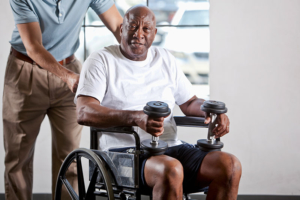 If your child suddenly developed an illness, who would you call? It’s a no-brainer; many parents have the number on speed dial for the pediatrician they have carefully selected to oversee the medical care needs of their children. Due to their specialized training, working with a trusted pediatrician ensures the best possible care.
If your child suddenly developed an illness, who would you call? It’s a no-brainer; many parents have the number on speed dial for the pediatrician they have carefully selected to oversee the medical care needs of their children. Due to their specialized training, working with a trusted pediatrician ensures the best possible care.
Likewise, choosing a physician for senior loved ones who focuses on senior health care concerns is equally as essential. Yet unfortunately, the health care system as a whole has not placed a great focus on the distinct health care needs of older adults. Dr. Carla Perissinotto, geriatrician and professor of medicine at the University of California, San Francisco, explains her concern over this age-related health care gap, and how little professors in med school are focused on caring for senior patients.
In fact, reflecting on her own residency, she shares, “We literally did the same thing for forty-year-olds as we did for eighty-year-olds, and we’d treat all eighty-year-olds the same whether they’re dependent or independent, have limited life expectancy or complete life expectancy, and that just didn’t sit well with me.”
Fortunately, there has been a new push to provide med students with additional training in geriatrics, including an emphasis on a holistic approach to senior care – viewing the body as a whole. It is very important for seniors to have a reliable geriatrician who can manage and piece together the results of the often multiple specialists an older adult patient sees. In fact, providing additional education for anyone who comes in contact with seniors in a medical setting – from hospital receptionists to EMTs and triage workers to doctors and nurses – is essential to overcome ageism and ensure seniors receive the level of care they need and deserve.
Additionally, older adults and their family caregivers might want to look into the services of a geriatrician as their primary care physician. Not to be confused with gerontologists, who specialize in aging-related issues but are not medical doctors, geriatricians are board-certified physicians who have finished a fellowship in geriatric medicine and have also passed the Geriatric Medicine Certification Exam.
According to the American Society of Geriatrics, there are approximately 7,000 certified geriatricians in the United States. They recommend asking the following questions when selecting a geriatrician:
- What training and certification have you received?
- Do you accept my insurance coverage?
- Will you work with all members of my healthcare team?
- How is communication handled – texts about prescription refills, email appointment reminders, etc.?
- What is your guiding philosophy?
Visit the geriatrician for an initial consultation, and evaluate additional details such as:
- Is the office easy to access?
- Is there lots of parking?
- Is the staff respectful and courteous?
- Does the geriatrician speak directly to the older adult?
- Are questions answered thoroughly?
Don’t dismiss your gut feelings. If any warning signs are noted, you may want to consider searching further to ensure the geriatrician selected is an individual both you and your loved one are fully comfortable with.
At Responsive Home Care, our staff are thoroughly trained in providing respectful, specialized care for older adults within the comfort of home. Contact us any time at 954-486-6440 for help and support or to acquire more information about our customized Pembroke Pines senior care services and care throughout Broward County.


 If your child suddenly developed an illness, who would you call? It’s a no-brainer; many parents have the number on speed dial for the pediatrician they have carefully selected to oversee the medical care needs of their children. Due to their specialized training, working with a trusted pediatrician ensures the best possible care.
If your child suddenly developed an illness, who would you call? It’s a no-brainer; many parents have the number on speed dial for the pediatrician they have carefully selected to oversee the medical care needs of their children. Due to their specialized training, working with a trusted pediatrician ensures the best possible care. What motivates you to get up out of bed every morning? The answer is different for every single one of us, of course, but there is one commonality: it could allow you to live longer. Scientific studies are answering the question, “Does having a sense of purpose help us to live longer?” with a resounding “Yes!” as evidenced in Japan, the country with the highest life expectancy on earth.
What motivates you to get up out of bed every morning? The answer is different for every single one of us, of course, but there is one commonality: it could allow you to live longer. Scientific studies are answering the question, “Does having a sense of purpose help us to live longer?” with a resounding “Yes!” as evidenced in Japan, the country with the highest life expectancy on earth. If you knew that a significantly better quality of life could be achieved for someone you care about, you wouldn’t hesitate to explore that option. Yet one of the most beneficial types of care – hospice care – is one that family members shy away from, because of many different hospice misconceptions.
If you knew that a significantly better quality of life could be achieved for someone you care about, you wouldn’t hesitate to explore that option. Yet one of the most beneficial types of care – hospice care – is one that family members shy away from, because of many different hospice misconceptions. If it feels like a senior with
If it feels like a senior with  As we’re finally easing our way out of this pandemic, we’re finding more about how it has harmed senior loved ones – both physically and emotionally. We know older adults have been at a higher threat of serious issues and death due to the COVID-19 virus, although the impact of 15 months of social isolation and physical distancing is similarly distressing.
As we’re finally easing our way out of this pandemic, we’re finding more about how it has harmed senior loved ones – both physically and emotionally. We know older adults have been at a higher threat of serious issues and death due to the COVID-19 virus, although the impact of 15 months of social isolation and physical distancing is similarly distressing.




